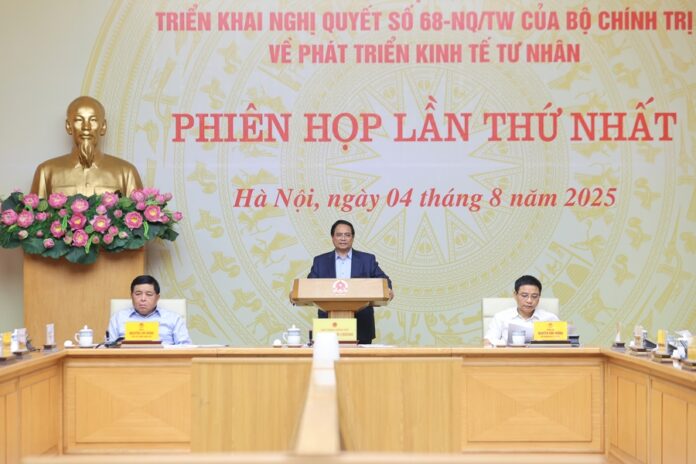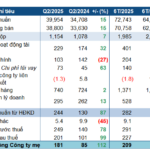The meeting was attended by Deputy Prime Minister Nguyen Chi Dung, permanent vice-head of the Steering Committee; Minister of Finance Nguyen Van Thang, vice-head of the Steering Committee; members of the Steering Committee, leaders of ministries, sectors, and localities, and representatives of private enterprises and associations.
Earlier, less than two weeks after Party General Secretary To Lam signed and issued Resolution 68-NQ/TW on May 13, 2025, the Government directed the construction and issuance of Resolution 138/NQ-CP on the Government’s action plan to implement Resolution 68.
The Government reported to the National Assembly to issue Resolution No. 198/2025/QH15 on special mechanisms and policies to develop the private economy on May 16, 2025, at the 9th session, focusing on institutionalizing the groups of solutions with clear content and urgency. At the same time, the Government issued Resolution 139 on the action plan to implement the National Assembly’s Resolution 198.
On May 18, 2025, the Politburo and the Secretariat organized a national online conference to propagate and implement this Resolution to all levels of party committees (along with Resolution No. 66-NQ/TW on innovating the work of building and enforcing laws).
On May 30, 2025, the Prime Minister issued a decision to establish the National Steering Committee for the implementation of Resolution 68. On May 31, 2025, the Prime Minister chaired a direct dialogue with businesses, cooperatives, and business households to effectively implement Resolution 68.
Concluding the meeting, Prime Minister Pham Minh Chinh emphasized the positive results and outstanding points in the implementation of Resolution 68 in the past time.
These results include renewed thinking and more decisive actions; spreading trust; issuing more institutions and policies focusing on resolving difficulties and obstacles for businesses; increasing the number of newly established enterprises; and large enterprises boldly proposing major projects for the country, such as railways, nuclear power, expressways, airports, and seaports.
Along with this, the three strategic breakthroughs (institutions, infrastructure, and human resources) serving the development of enterprises have been promoted; the administration at three levels (central, provincial, and grassroots levels) has reduced administrative procedures and compliance costs and has become more convenient for people and businesses; public-private partnerships have been promoted with the Law on Investment in the form of Public-Private Partnerships amended; and ministries and sectors have coordinated more closely to resolve businesses’ difficulties.
However, the Prime Minister frankly pointed out that, overall, the changes are still slow compared to the requirements, especially in terms of mechanisms and policies that meet the stronger, faster, and more efficient development of businesses; administrative procedures and decentralization are still problematic at the central and local levels; and support resources are limited in terms of both mechanisms, policies, and financial resources.
Looking ahead, the Prime Minister requested that we remain steadfast in the goals set by the Politburo, National Assembly, and Government, suitable to the specific circumstances and conditions, and meet the demands of enterprises, with the overall goal of making the private sector the most important driving force of the economy.
Pointing out 15 specific tasks and solutions, the Prime Minister directed continuing to raise awareness, change thinking, and take more forceful and vigorous actions to create momentum, inspire, and create a trend of private economic development in the new context; spreading trust among the people, businesses, and international friends.
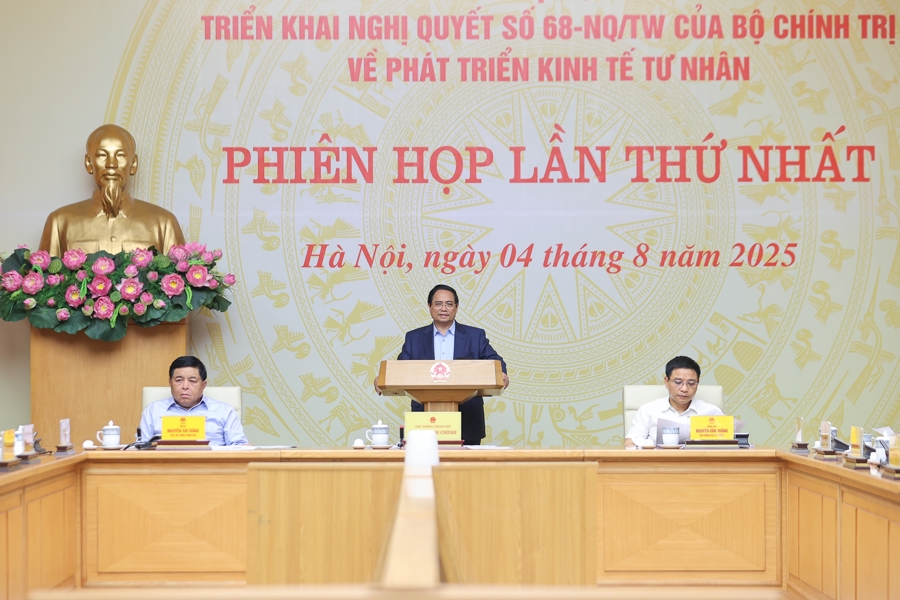
Ministries and sectors continue to promote the resolution of institutional bottlenecks; review, amend, and supplement relevant laws, decrees, and circulars related to taxes, fees, land access, natural resources and minerals, interest rate support, human resource training, administrative sanctions on competition, science and technology, and digital transformation…, turning institutions into a competitive advantage.
The Government Office develops a roadmap to reduce procedures, time, and costs for implementing administrative procedures; promotes decentralization and empowers localities in handling administrative procedures.
Localities supplement and perfect planning to develop new projects, publicly call for investors to approach equality, openness, and transparency.
The Prime Minister requested strongly promoting the three strategic breakthroughs, with institutions being open and reducing compliance costs, infrastructure being smooth to reduce input costs and create new development space and new value, and human resources training meeting the requirements of enterprises’ transformation. There should be a mechanism to mobilize preferential capital for private enterprises, especially in science, technology development, innovation, and digital transformation under Resolution 57 of the Politburo.
The Ministry of Finance develops a group of policies to support small and medium-sized enterprises and business households in terms of taxes and tax procedures, tax connection, and promotes the transformation of business households into enterprises, small enterprises into large enterprises, and large enterprises into global and multinational enterprises. The Ministry of Finance is also assigned to develop a mechanism to support infrastructure (electricity, land rent, fees, and charges).
The Prime Minister also requested the development of criteria to evaluate the satisfaction of people and businesses, criteria to measure and reflect the results of serving the people and businesses. The Ministry of Home Affairs guides and proposes emulation and rewards on the occasion of the 80th anniversary of National Day and Vietnamese Entrepreneurs’ Day (October 13).
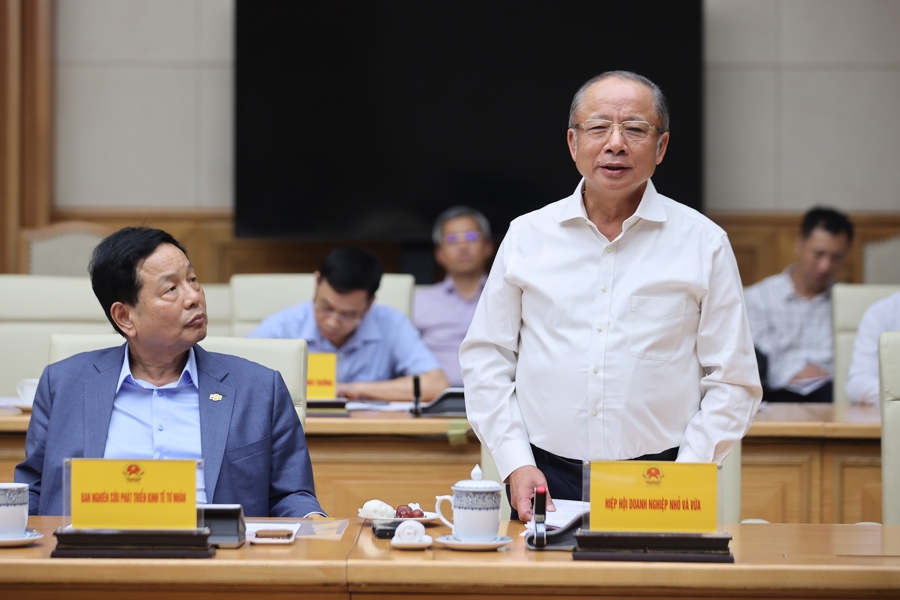
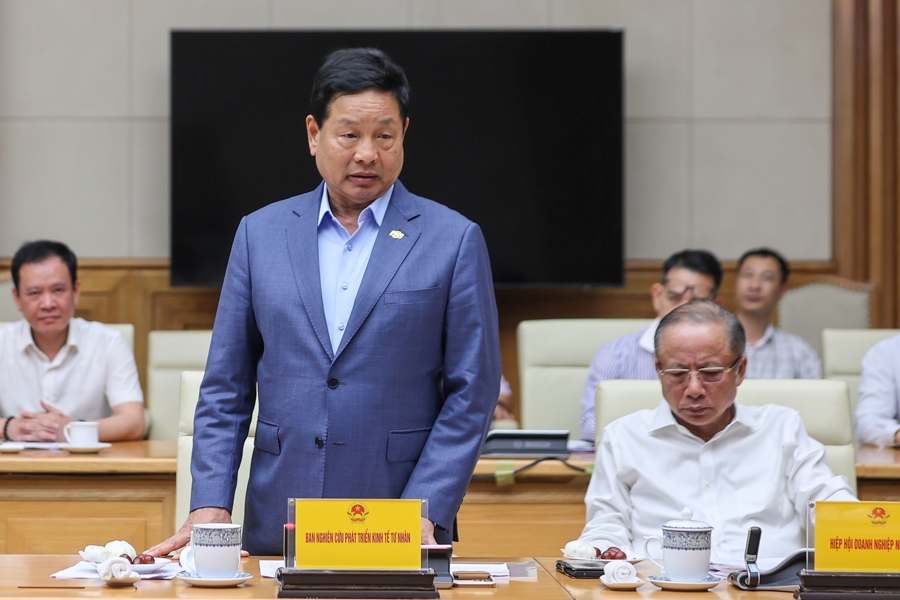
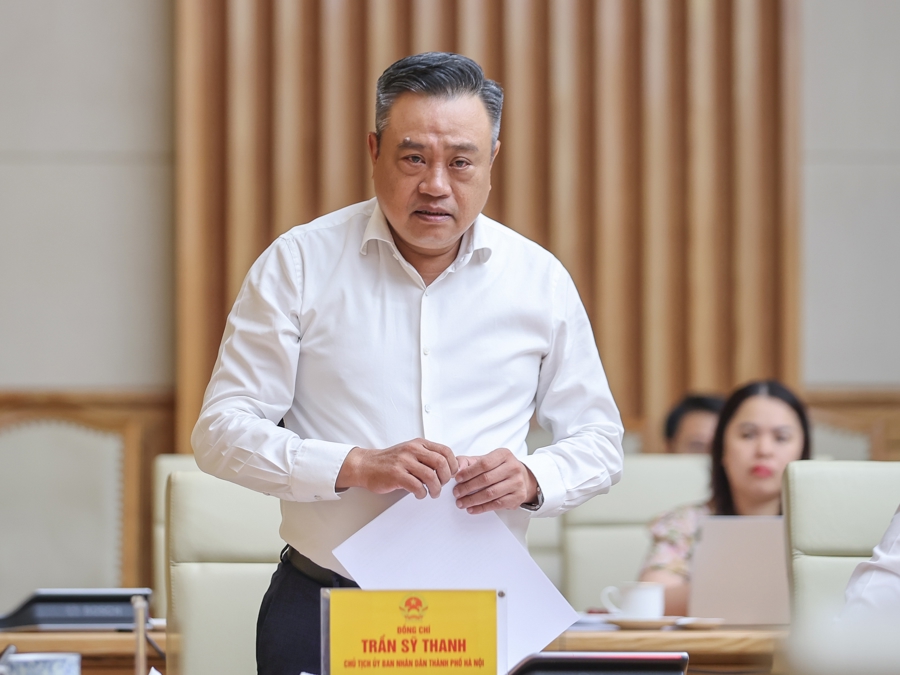
Delegates attending the meeting – Photo: VGP
The Prime Minister directed 18/34 localities that have not yet built to develop plans to implement the Resolution. Along with that, the Private Economic Development Research Group of the Advisory Council for Administrative Procedure Reform continues to grasp and evaluate the implementation of the Resolution, ensuring accuracy and avoiding painting a rosy or dark picture.
Emphasizing that the tasks to be completed by the end of this year are very heavy, the Prime Minister requested that ministries, sectors, and localities raise their sense of responsibility, strengthen supervision, inspection, and urge each level to solve their problems.
Along with this, promote dialogue, listen to each other’s opinions, and participate in building institutions, mechanisms, and policies for businesses, business households, and people; build a monitoring mechanism and strengthen the supervision of the Vietnam Fatherland Front and socio-political organizations; and develop plans to monitor localities.
Assigning the Ministry of Finance to develop a plan for implementation from now until the end of the year, the Prime Minister suggested that all levels, sectors, and members of the Steering Committee continue to promote their sense of responsibility, unity, consensus, and unanimity, “the whole country is one army, marching towards the goal must be swift and bold, winning must be sure, winning must be sure, ensuring both immediate and long-term requirements.”
At the same time, deploy synchronously, comprehensively, effectively, and urgently the tasks and solutions set out in the Resolutions, “turning nothing into something, turning difficulties into easiness, turning impossibility into possibility”, “resources come from thinking, motivation comes from innovation and creativity, and strength comes from the people and businesses.”
The Prime Minister emphasized the requirement to implement substantially and forcefully, to keep the commitment, to produce products, and to organize the implementation in the spirit of “6 on-the-spots”: on-the-spot person, on-the-spot job, on-the-spot responsibility, on-the-spot time, and on-the-spot product.”
The Prime Minister requested continuing to bring the Resolution to life, creating a trend and measuring stick, with the ultimate goal being the contribution of the private sector and the private economy to socio-economic development, contributing more and higher to GDP, breaking through in science and technology development, innovation, and labor productivity, and stepping together into a new era.
“Rescuing” 11 Loss-Making BOT Projects
The governing body is set to introduce new regulations to aid 11 transport projects that are facing financial difficulties. These projects, which were agreed upon before January 1, 2021, will receive support to get back on track and ensure their financial viability.
“EVFTA: A Half-Decade Trade Triumph for Vietnam and the EU, with Nearly $300 Billion in Commerce”
After 5 years in effect, the EVFTA has facilitated trade between Vietnam and the EU, totaling nearly $300 billion. This has elevated Vietnam’s standing in ASEAN and on the global stage. The agreement has also driven institutional reforms, promoted the adoption of international standards, and fostered stronger business connections.
The Art of Investment: Navigating the 20% Tariff on Vietnamese Goods in the US
On August 1, 2025, the Trump administration announced retaliatory tariffs on goods from several countries. The tariffs, which took effect immediately, impose a 20% tax on goods originating from Vietnam.


























